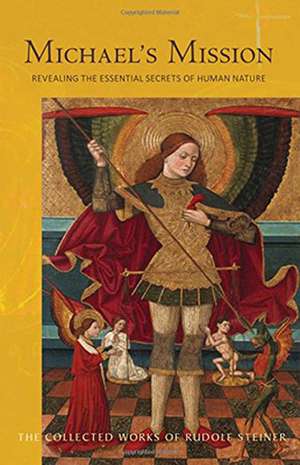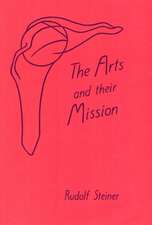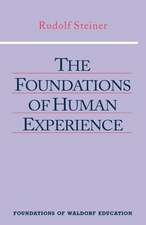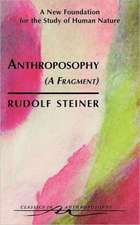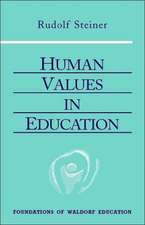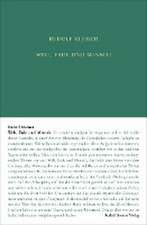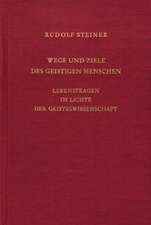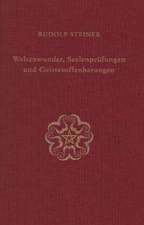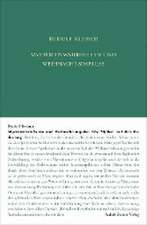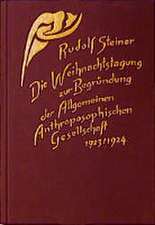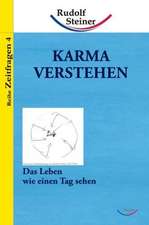Michael's Mission: Collected Works
Autor Rudolf Steineren Limba Engleză Paperback – 15 noi 2015
"This will generate a struggle covering the face of the whole earth. The one and only remedy for this nonsense being made of human evolution will be the path that can lead humanity to the spirit--the path of Michael, which finds its continuation in the path of Christ." --Rudolf Steiner
Speaking in the aftermath of World War I, Rudolf Steiner presents a series of extraordinary lectures on the power and mission of the Archangel Michael. He paints on a broad canvas--in the context of cosmic and human evolution--revealing Michael's tasks in the past, present, and future. Michael, originally the countenance of Yahweh, has transformed from a "night spirit" into a "day spirit." As "the Countenance of Christ," Michael helps us find a balance between luciferic and ahrimanic tendencies. The old dualism such as good versus evil, says Steiner, needs to be replaced by the trinity of Lucifer-Christ-Ahriman. Filling our hearts with the Christ impulse creates equilibrium between the luciferic influence that imbues our head and the ahrimanic influence that works in our limbs.
Steiner describes how humanity faces three dangers in the social sphere--spiritual life could flow into the "pit of mendacity" ruled by Ahriman; individual rights might descend into a luciferic "pit of selfishness"; and economics could sink into the cultural sickness and death of the Asuras. To prevent Western culture from perishing, it will need to turn toward the contemporary "threefold" approach to society.
Steiner also speaks of the principle of metamorphosis in connection with evolution and devolution, as he showed in the pillar designs of the newly built Goetheanum. Architectural styles express human evolution, as we can see in Greek temples, gothic Cathedrals, the Grail temple, and the building at Dornach. Among many other themes, Rudolf Steiner addresses the problem of natural necessity and freedom and the abolition of the trichotomy of body, soul, and spirit at the 869Council of Constantinople.
Din seria Collected Works
-
 Preț: 108.76 lei
Preț: 108.76 lei -
 Preț: 129.99 lei
Preț: 129.99 lei -
 Preț: 190.18 lei
Preț: 190.18 lei -
 Preț: 137.12 lei
Preț: 137.12 lei -
 Preț: 87.06 lei
Preț: 87.06 lei - 33%
 Preț: 7748.04 lei
Preț: 7748.04 lei - 34%
 Preț: 9794.70 lei
Preț: 9794.70 lei - 34%
 Preț: 4104.45 lei
Preț: 4104.45 lei - 34%
 Preț: 7899.56 lei
Preț: 7899.56 lei - 35%
 Preț: 13523.09 lei
Preț: 13523.09 lei - 34%
 Preț: 14507.86 lei
Preț: 14507.86 lei - 34%
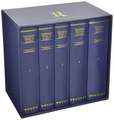 Preț: 6713.64 lei
Preț: 6713.64 lei - 35%
 Preț: 4424.16 lei
Preț: 4424.16 lei - 34%
 Preț: 12862.66 lei
Preț: 12862.66 lei - 34%
 Preț: 4375.25 lei
Preț: 4375.25 lei - 34%
 Preț: 12869.78 lei
Preț: 12869.78 lei - 35%
 Preț: 17272.45 lei
Preț: 17272.45 lei - 34%
 Preț: 7021.31 lei
Preț: 7021.31 lei - 35%
 Preț: 4286.35 lei
Preț: 4286.35 lei - 34%
 Preț: 622.41 lei
Preț: 622.41 lei - 18%
 Preț: 215.85 lei
Preț: 215.85 lei - 17%
 Preț: 222.23 lei
Preț: 222.23 lei - 18%
 Preț: 218.03 lei
Preț: 218.03 lei - 17%
 Preț: 223.13 lei
Preț: 223.13 lei - 17%
 Preț: 202.91 lei
Preț: 202.91 lei - 16%
 Preț: 207.47 lei
Preț: 207.47 lei - 16%
 Preț: 227.86 lei
Preț: 227.86 lei -
 Preț: 97.71 lei
Preț: 97.71 lei - 18%
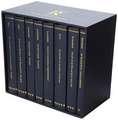 Preț: 7699.46 lei
Preț: 7699.46 lei - 18%
 Preț: 5949.88 lei
Preț: 5949.88 lei - 18%
 Preț: 4426.09 lei
Preț: 4426.09 lei - 56%
 Preț: 581.65 lei
Preț: 581.65 lei - 18%
 Preț: 851.36 lei
Preț: 851.36 lei -
 Preț: 420.29 lei
Preț: 420.29 lei -
 Preț: 312.36 lei
Preț: 312.36 lei -
 Preț: 344.16 lei
Preț: 344.16 lei -
 Preț: 273.98 lei
Preț: 273.98 lei
Preț: 136.61 lei
Nou
Puncte Express: 205
Preț estimativ în valută:
26.15€ • 28.49$ • 21.94£
26.15€ • 28.49$ • 21.94£
Carte disponibilă
Livrare economică 27 noiembrie-11 decembrie
Livrare express 12-16 noiembrie pentru 29.58 lei
Preluare comenzi: 021 569.72.76
Specificații
ISBN-13: 9781855845176
ISBN-10: 1855845172
Pagini: 272
Dimensiuni: 155 x 236 x 22 mm
Greutate: 0.48 kg
Editura: Rudolf Steiner Press
Seria Collected Works
ISBN-10: 1855845172
Pagini: 272
Dimensiuni: 155 x 236 x 22 mm
Greutate: 0.48 kg
Editura: Rudolf Steiner Press
Seria Collected Works
Notă biografică
Rudolf Steiner (1861-1925) was born in the small village of Kraljevec, Austro-Hungarian Empire (now in Croatia), where he grew up. As a young man, he lived in Weimar and Berlin, where he became a well-published scientific, literary, and philosophical scholar, known especially for his work with Goethe's scientific writings. At the beginning of the twentieth century, he began to develop his early philosophical principles into an approach to systematic research into psychological and spiritual phenomena. Formally beginning his spiritual teaching career under the auspices of the Theosophical Society, Steiner came to use the term Anthroposophy (and spiritual science) for his philosophy, spiritual research, and findings. The influence of Steiner's multifaceted genius has led to innovative and holistic approaches in medicine, various therapies, philosophy, religious renewal, Waldorf education, education for special needs, threefold economics, biodynamic agriculture, Goethean science, architecture, and the arts of drama, speech, and eurythmy. In 1924, Rudolf Steiner founded the General Anthroposophical Society, which today has branches throughout the world. He died in Dornach, Switzerland.
Descriere
Speaking in the aftermath of the Great War, Rudolf Steiner presents a series of extraordinary lectures on the power and mission of the Archangel Michael. He paints on a broad canvas - in the context of cosmic and human evolution - revealing Michael's tasks in the past, present and future.
